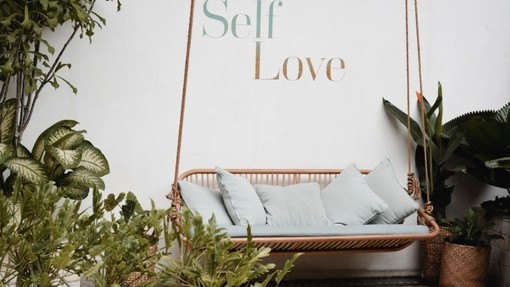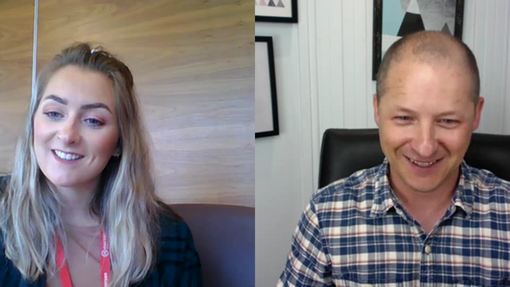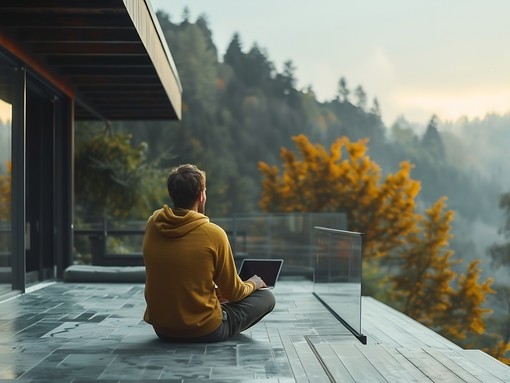
Contents
- Why are setting boundaries important?
- How do people start to set and maintain good boundaries?
- What is the real importance of putting oneself, first?
- ‘How can you give to others when you have nothing for yourself?’
- Is there a difference between self-love Vs self-care?
- Is self-care, selfish?
- How can we put a positive twist on the pandemic and seize the moment for self-care?
- What is the biggest challenge people face regarding self-care?
Contents
2020 and 2021 saw seismic socio-economic changes across the globe, with an upsurge in remote, hybrid and flexible working which has for the most part continued during 2022. This new reality has posed a new set of challenges daily both at home and at work, with new sets of stresses and anxieties. Now more than ever, practicing self-care is essential, we must place our emotional health and well-being first.
The pandemic has radically altered the way we live, socialise, and work. We have had to relearn new social norms, and this has led to needing to create a new set of boundaries. Amidst a time of self-love and self-care being placed at the forefront of our lives, gone are the days of working ourselves into stress and allowing people to overstep our personal boundaries. Setting boundaries both with the people in our personal lives and those in our working lives can be challenging but rewarding long term.
Conventionally, self-care has been a weekend or evening thing, it can be when you treat yourself to a spa day, do some meal prep or do a face mask after a long jog. It is something that has been notoriously incompatible with work. However, we caught up with Robin Goldsbro, managing director of Level 7 Coaching and successful life coach, who explained the importance of self-care and setting boundaries, and how this can reflect better throughout your work life.

Why are setting boundaries important?
Boundaries are there to be set between yourself and others, they can be set between yourself and your co-workers, friends, and family, or simply they can purely be boundaries for yourself. Boundaries are important in helping create a healthy structured lifestyle. They are there to prevent you from perhaps impulse buying in Tesco or overindulging in several share bags after dinner time or even staying up past 1am to watch that next episode of Line of Duty when you need to be up at 7am for work. The boundaries we set personally for ourselves are just as important as the ones we set for other people. Often development in your self-esteem goes hand-in-hand with better defining boundaries. It allows you a certain amount of confidence in one’s own worth and abilities, setting boundaries in all areas of your life has never been more important.
How do people start to set and maintain good boundaries?
If you come away from a phone-call or meeting feeling depleted or anxious, it’s likely some boundaries have been crossed. Boundaries are beneficial for far more than just defining our identity but having them in place can also help limit your exposure to stress, which long term protects your mental well-being.
For me, it is all about energy and maintaining this. I can spend hours coaching people throughout the day, but I will not feel emotionally drained because I love doing it and my energy comes from helping people.
Sometimes people are unsure how to go about creating these boundaries or effectively uphold ones they keep trying to reinforce, it can therefore be best to start of small and set some that are easily achievable. This way you can build them up slowly and it doesn’t cause such a strain or huge change on your day-to-day life. It can also be hard to introduce boundaries into areas of your life when you have always done things a certain way such as working late or logging on at the weekend. It is helpful to set expectations early and then everyone knows where they stand, and it avoids people feeling let down. Communication and consistency are also key. Letting boundaries slide and change can be confusing, keep them simple and straight to the point and allow yourself to communicate when someone may have overstepped a boundary you have put in place.
Particularly at work, it is important to communicate and highlight when you’re feeling stressed or simply do not have the time to complete tasks. Having a healthy relationship with co-workers and boss and setting boundaries from the start, can really impact other areas of your life in a positive way.
It can often be easy to let certain parts of our life fall by the wayside, but by following simple steps and keeping a strong foundation of boundaries across all aspects of your life and showing yourself a bit of self-love, you will see yourself flourish in all areas of your life combined.
What is the real importance of putting oneself, first?
Happiness. It is the ultimate feeling we all try to achieve. Any behaviour or action a person is doing, no matter what it is, needs to be linked to having a positive outcome for them moving forward to achieve this happiness. Whether that be retail therapy, looking after someone else, putting your energy into working or some time alone reading a book, we all need time to recharge and do something that makes us happy. One cannot be happy if you’re feeling hollow and drained, it simply isn’t possible.
Often people will throw themselves into their work, working ridiculous hours hoping this can bring them happiness, but essentially, they’re going to feel burnt out and potentially feel even worse. Life and work are certainly a marathon so we shouldn’t treat them like a sprint, it isn’t maintainable and can only lead to us feeling drained and a lull in our energy levels. Tiredness can lead to ideas of self-doubt; I often encourage my clients to have self-care days as this will build motivation and lead to true self-love.
We spend a lot of our time giving to others, giving our time, energy, and efforts. We need to pause occasionally, and think what have I done for myself? This doesn’t mean you always have to put yourself first and not put any time into caring for other people. Often people do this as a form of self-care as self-care is not only caring for yourself, but it reflectively is caring for others. However, if you are utterly drained of energy you will have nothing left to give, so how are you meant to look after together without first, looking after yourself.
‘How can you give to others when you have nothing for yourself?’
Is there a difference between self-love Vs self-care?
Our relationship with ourselves impacts every single area of our lives; so, it is unsurprising that self-love is a hot topic these days. There is a clear-cut difference between self-love and self-care, and both can have a huge impact on our working and home lives.
Self-care is an expression of self-love. It is the bit that involves you taking care of yourself and putting yourself first. Self-love can be seen as something a little bit broader and more difficult to learn. It is more about respecting yourself and loving and accepting yourself for who you are. To love yourself is to know yourself and understand. It is ultimately self-esteem and knowing you’re not yet your finished article. We’re always going to be growing and learning, everything is in constant flow and flux and we are always different person who will grow through lived experiences. You are never a static person and realising this is important for self-love. A lot of us can struggle with this due to pressures of society and that others place on us; people can struggle to self-accept when they are always comparing themselves to others. We need to look after both simultaneously.
Is self-care, selfish?
The pandemic has certainly had a negative impact on people’s mental health and well-being. With constant worries and anxieties, people are beginning to question themselves and their lifestyles more. The need to take care of ourselves has grown ever more paramount. I think there is a huge misconception with spending time on yourself as something that is selfish. There is a difference between self-absorbed, narcissistic behaviour and time spent on oneself, taking care of number one. Being selfish is having the desire to take away from others and not give back, but self-care is all about replenishing your own resources without depleting someone else’s. Restoring your own energy promotes a healthier lifestyle, both physically and mentally. Taking a day for yourself shouldn’t create feelings of guilt, it is self-care for the mind and soul and can help you when embracing and being better in touch with your emotions.

How can we put a positive twist on the pandemic and seize the moment for self-care?
I think throughout the past year and a half people have been able to truly realise what’s important to them. Things such as the long commutes and all the long hours at the office away from family and friends hasn’t provided them what they once thought it did.
For a lot, they have seen this as a time for themselves. Home supplies have been quite difficult to get hold of and this just highlights how people are putting more time and efforts into themselves and their homes. We have had to spend more time in our homes and thus our relationship with them have changed, they have become the office, the gym, schools, and our homes without a moment’s notice. People have evolved and developed them placing things like bars and miniature cafes in their back gardens. Our environments are changing and the way we spend time with people in these environments have too, we have truly been able to appreciate what is important. It isn’t about where we are it’s about what we’re doing and who we’re with. It isn’t about where we work it’s purely about what we’re working on that counts.
Understandably some have loved this time spent on their own and have really been able to seize opportunities for self-care. They can pop the washing on whilst having a 5-minute break whilst working from home or sit in a face mask whilst finishing a report. Others have however struggled with that and are looking forward to offices reopening so that they can reconnect with people. Self-care is truly personal to each other and many seek comfort in connecting with others. This time has provided us with the opportunity to think about what is important to us personally.
It’s important for people who struggle to remember to try and not get sucked back into the old ways to being and doing. Be more consciously aware of what you have gained and maintain that when you go back to work. Protect what you have found most important and interlace this into your ‘post-pandemic’ lifestyle.
It’s been great to see people acknowledging that they have found positives to this new way of living. Some have been more productive in shorter amounts of time as they’ve been more comfortable in their new surroundings.
What is the biggest challenge people face regarding self-care?
I think a big part and challenge of self-care is learning and knowing when to take a break and relax. Taking a break from the things that don’t give you energy, perhaps this is from working or socialising or running errands. We all struggle to truly relax; I know for a lot just keeping off their emails when they’re supposed to be taking a break is a challenge they face. People are often captivated by the idea that if they’re not doing something productive or to help them progress then they’re idle and aren’t moving onwards. Likewise, we’re all fed the idea that being idle is something negative, when in reality it’s not. It provides a moment of tranquillity or creativity. Whether this be something simple like going for a walk or sitting down for a chat with a friend and a cup of tea because it makes you feel less alone and more connected, it’s all about regenerating our energy flows in the most positive way we can. Looking after ourselves but having fun whilst doing so, finding the activities that bring us joy or just revelling in our own solidarity
So, take a step back from the rat race and let’s get re-charging ourselves. Start that painting you’ve been putting off; try that new workout you saw online and hop in the bath and read that book that’s started to collect dush on your bedside table. It’s time to start doing things for us and take charge of our own energy by doing the things we love!
Robin Goldsbro is a neuro-linguistic expert and founder of Level7 coaching, contact him today for life coaching and more at Robin@levelseven.org.
Looking for your ideal workplace? Search Morson jobs now.
Contents
- Why are setting boundaries important?
- How do people start to set and maintain good boundaries?
- What is the real importance of putting oneself, first?
- ‘How can you give to others when you have nothing for yourself?’
- Is there a difference between self-love Vs self-care?
- Is self-care, selfish?
- How can we put a positive twist on the pandemic and seize the moment for self-care?
- What is the biggest challenge people face regarding self-care?
















